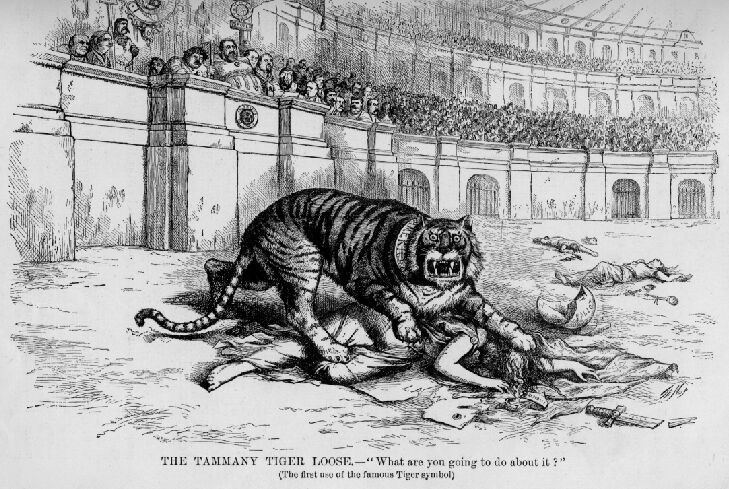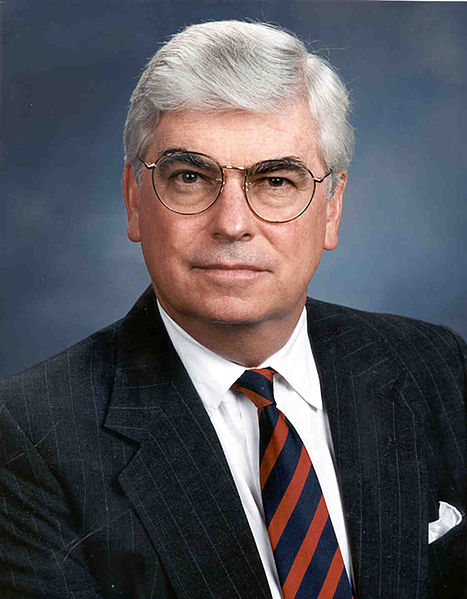(This and unlabeled images from Wikimedia Commons)
The opinion I hear most frequently is some variation of "All politicians are alike", or "There's no difference between the two parties". It's not intended as a compliment. Politicians as a class are regarded with cynicism and contempt by the people they represent. They're regarded as corrupt, as lazy, as completely self-interested and utterly removed from the concerns and needs of their constituencies. The polling data on this is unambiguous.
But this nearly ubiquitous insistence that both parties are equally contemptible is held by different people for different reasons. People may fail to differentiate between the parties because they're simply disinterested in politics generally, and can't be bothered to look for nuance. People may be Libertarians and regard any manifestation of government as undesirable. And people I think of as "the Hard Left" are convinced that our politicians are nothing more than sock puppets for an ultra-wealthy elite, regardless of the party to which the politician belongs.
If we treat the entire American electorate as a single unit (admittedly committing some analytical violence in the process), then its defining characteristic is its political inattentiveness. This is a more controversial point than it ought to be. There's a great deal of political science literature devoted to attributing some sort of meta-rationality to citizens who don't vote, don't watch the news and who can't tell you the name of their elected representatives.
Apologists for the electorate have blamed a sensational, celebrity obsessed media for people's lack of awareness. This fails to account for what the media is in this country: a profit maximizing business. And while a simplistic supply-demand curve understates the extent to which sellers create demand, it is absolutely the case that sensational, celebrity driven coverage is simply a more popular product than political information. The media doesn't "cause" apathy. The nature of the media is the "effect" of apathy. There's no money in making people think too hard about their politics.
This is one of the origins of that bane of political news, "Beltway false equivalence". If a Republican claimed the Earth was flat, (and is it really a stretch to imagine that they might?) lazy, insider journalists more concerned with their membership in the clubby, get along community in D.C. would report that "Democrats say the Earth is round, Republicans disagree". Any more detailed analysis would challenge the electorate's own laziness, and cause them to flee to the safety of some mindless, idiotic sitcom.
The truth is, America is a democracy. Any such political system makes the citizens ultimately responsible for forming their own political views. If there were a popular demand for insightful political analysis, some entrepreneur would attempt to make a buck providing it.
Furthermore, the view that "they're all alike" is ACCURATE, in some highly limited contexts. And to the extent the view is accurate, it reinforces the INACCURATE belief that there's no meaningful difference in the two parties.
All politicians, from both parties, are single minded seekers of reelection. The system selects for that kind of monomania; politicians who take their eye off the electoral ball lose, and go into another business. Voters see the extent to which politicians will sell their soul to hold office, and it confirms their inaccurate view that politicians are indistinguishable by any standard.
Political parties also share an important similarity; the defining characteristic of the two major political parties is that they seek to win elections. Consequently their electoral behaviors will appear to be similar, at least superficially.
But to focus on the similarities between the two parties, and their candidates is to lose sight of their only relevant aspect: policy.
Politicians, and the two parties which sponsor them advocate very different public policy alternatives. The Republican Party is wedded to policies which in every case protect and advance the interests of those with power. Their economic policies are grounded not in the science of Economics, but in the financial interests of the wealthy. Their social policies are grounded not in the findings of social science, but rather in the preservation of the privileged place of the white patriarchy. In every single area of public policy debate, Republicans advocate policies which protect and enhance the power of wealthy white men.
By the same token, the policies advocated and advanced by the Democrats aim at distributing wealth and power across the society more broadly.
These are non-trivial differences. They have affected, and will affect the daily life of every single resident of the United States. If you are a woman, or if you are a member of a racial minority, or if you are not wealthy, you absolutely have a stake in which party's candidates are put into positions of power. Your vote will exert a near-term impact on your life. This stuff matters.
And an intellectually lazy dismissal of this fact can be likened to the thoughtless shuffling of livestock to the killing floor.
(Corrupt Democrat and sock-puppet Chris Dodd)
If we treat the entire American electorate as a single unit (admittedly committing some analytical violence in the process), then its defining characteristic is its political inattentiveness. This is a more controversial point than it ought to be. There's a great deal of political science literature devoted to attributing some sort of meta-rationality to citizens who don't vote, don't watch the news and who can't tell you the name of their elected representatives.
Apologists for the electorate have blamed a sensational, celebrity obsessed media for people's lack of awareness. This fails to account for what the media is in this country: a profit maximizing business. And while a simplistic supply-demand curve understates the extent to which sellers create demand, it is absolutely the case that sensational, celebrity driven coverage is simply a more popular product than political information. The media doesn't "cause" apathy. The nature of the media is the "effect" of apathy. There's no money in making people think too hard about their politics.
This is one of the origins of that bane of political news, "Beltway false equivalence". If a Republican claimed the Earth was flat, (and is it really a stretch to imagine that they might?) lazy, insider journalists more concerned with their membership in the clubby, get along community in D.C. would report that "Democrats say the Earth is round, Republicans disagree". Any more detailed analysis would challenge the electorate's own laziness, and cause them to flee to the safety of some mindless, idiotic sitcom.
(image from CBS. The Republic is doomed.)
The truth is, America is a democracy. Any such political system makes the citizens ultimately responsible for forming their own political views. If there were a popular demand for insightful political analysis, some entrepreneur would attempt to make a buck providing it.
(Rupert Murdoch, aka The anti-Christ)
Furthermore, the view that "they're all alike" is ACCURATE, in some highly limited contexts. And to the extent the view is accurate, it reinforces the INACCURATE belief that there's no meaningful difference in the two parties.
All politicians, from both parties, are single minded seekers of reelection. The system selects for that kind of monomania; politicians who take their eye off the electoral ball lose, and go into another business. Voters see the extent to which politicians will sell their soul to hold office, and it confirms their inaccurate view that politicians are indistinguishable by any standard.
Political parties also share an important similarity; the defining characteristic of the two major political parties is that they seek to win elections. Consequently their electoral behaviors will appear to be similar, at least superficially.
But to focus on the similarities between the two parties, and their candidates is to lose sight of their only relevant aspect: policy.
Politicians, and the two parties which sponsor them advocate very different public policy alternatives. The Republican Party is wedded to policies which in every case protect and advance the interests of those with power. Their economic policies are grounded not in the science of Economics, but in the financial interests of the wealthy. Their social policies are grounded not in the findings of social science, but rather in the preservation of the privileged place of the white patriarchy. In every single area of public policy debate, Republicans advocate policies which protect and enhance the power of wealthy white men.
(image from The Atlantic)
By the same token, the policies advocated and advanced by the Democrats aim at distributing wealth and power across the society more broadly.
These are non-trivial differences. They have affected, and will affect the daily life of every single resident of the United States. If you are a woman, or if you are a member of a racial minority, or if you are not wealthy, you absolutely have a stake in which party's candidates are put into positions of power. Your vote will exert a near-term impact on your life. This stuff matters.
And an intellectually lazy dismissal of this fact can be likened to the thoughtless shuffling of livestock to the killing floor.







No comments:
Post a Comment